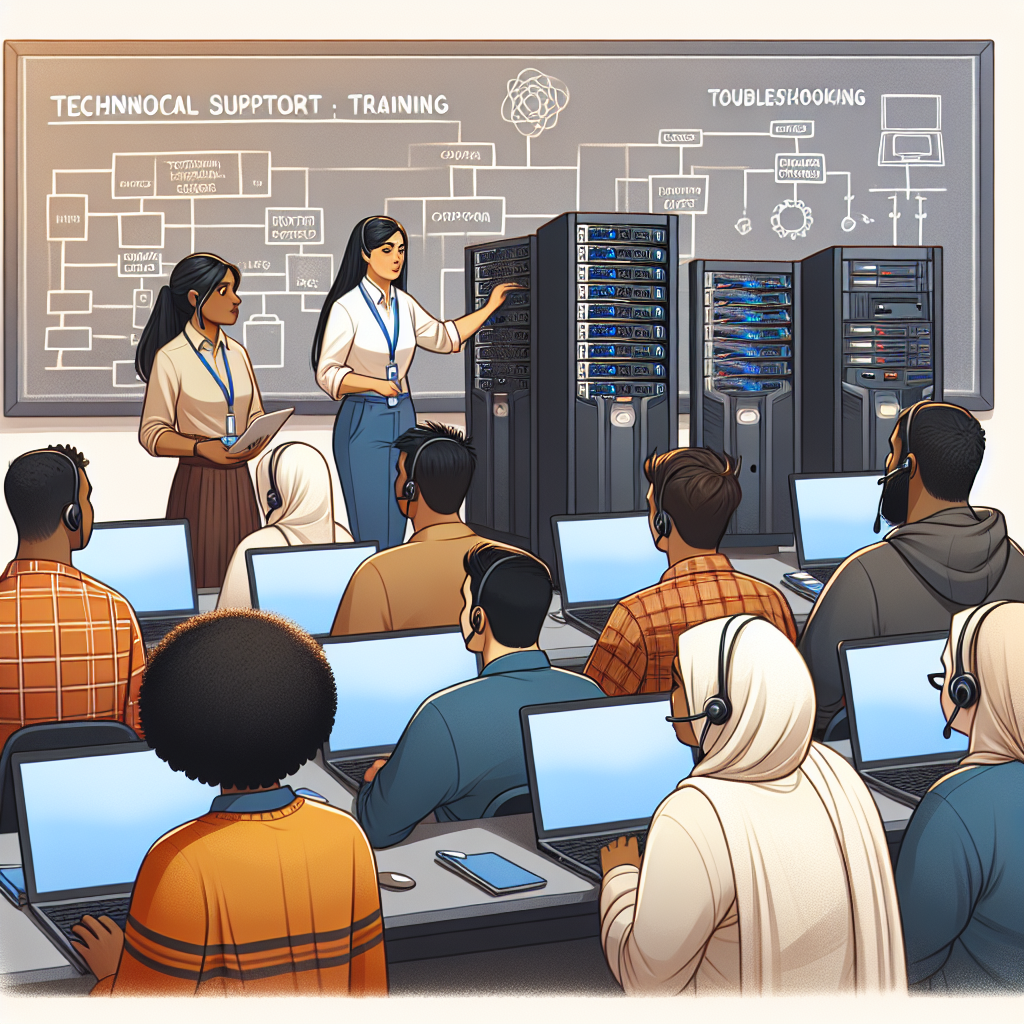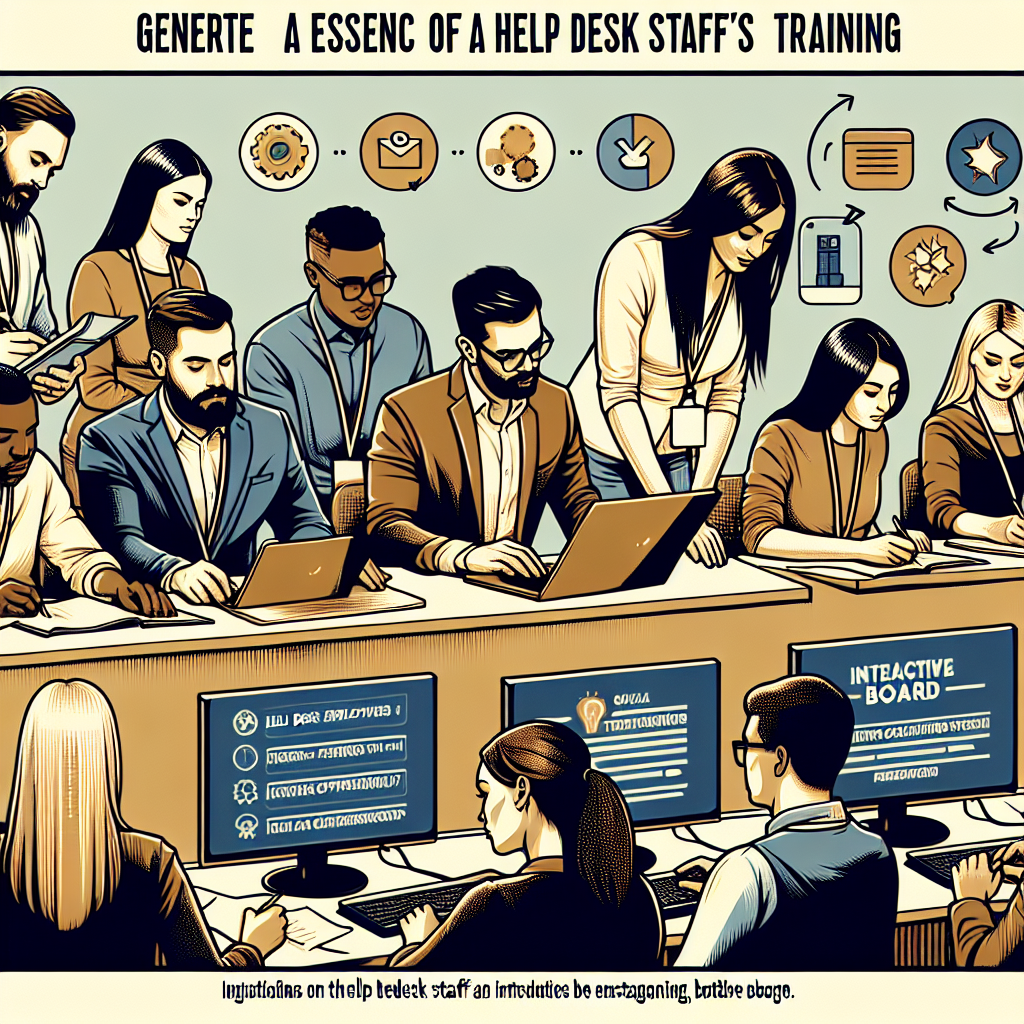Your cart is currently empty!
Tag: Training

Empowering Your Team with Comprehensive Technical Support Training
Empowering Your Team with Comprehensive Technical Support TrainingIn today’s fast-paced and technology-driven world, technical support teams play a crucial role in ensuring that businesses run smoothly and efficiently. From troubleshooting software issues to providing guidance on hardware maintenance, technical support professionals are the backbone of any organization’s IT infrastructure.
To ensure that your technical support team is equipped to handle any challenge that comes their way, it is essential to provide them with comprehensive training. By investing in the development of your team, you not only increase their skills and knowledge but also boost their confidence and morale, leading to improved productivity and customer satisfaction.
Here are some key strategies for empowering your team with comprehensive technical support training:
1. Identify Training Needs: Before implementing any training program, it is important to first identify the specific needs of your team. Conduct a skills assessment to determine areas where your team may be lacking and tailor the training program to address those gaps.
2. Provide Hands-On Training: Technical support is a hands-on job, so it is important to provide practical training exercises that simulate real-world scenarios. This will help your team develop problem-solving skills and gain confidence in their abilities.
3. Offer Ongoing Support: Technical support is a constantly evolving field, with new technologies and software updates being released regularly. To ensure that your team stays up to date, provide ongoing training and support to help them keep their skills sharp.
4. Encourage Collaboration: Encourage your team members to work together and share their knowledge and expertise. By fostering a culture of collaboration, you can create a more cohesive and effective technical support team.
5. Provide Feedback and Recognition: Recognize and reward team members who excel in their training and performance. Constructive feedback can also help team members identify areas for improvement and strive for excellence.
6. Invest in Training Resources: Provide your team with access to a variety of training resources, such as online courses, workshops, and certification programs. Investing in these resources will help your team stay competitive in the ever-changing technical support landscape.
Empowering your team with comprehensive technical support training is essential for the success of your business. By investing in the development of your team, you not only improve their skills and knowledge but also boost their confidence and morale, leading to a more productive and efficient workforce. With the right training and support, your technical support team will be well-equipped to handle any challenge that comes their way and provide exceptional service to your customers.

Best Practices for Training and Managing Help Desk Agents
Help desk agents play a crucial role in ensuring customer satisfaction and resolving issues in a timely manner. Training and managing these agents effectively can greatly impact the overall success of a help desk team. Here are some best practices for training and managing help desk agents:1. Clear Communication: Effective communication is key in the help desk industry. Agents should be trained to communicate clearly and concisely with customers, ensuring that they understand the issue at hand and the steps being taken to resolve it. Managers should also communicate expectations clearly to help desk agents to avoid confusion and improve performance.
2. Technical Training: Help desk agents should receive thorough technical training to ensure they have the knowledge and skills necessary to troubleshoot and resolve technical issues. This training should be ongoing, as technology is constantly evolving.
3. Customer Service Training: In addition to technical training, help desk agents should also receive customer service training. Agents should be trained to handle difficult customers, remain calm under pressure, and provide excellent customer service at all times.
4. Role-playing Exercises: Role-playing exercises can be a valuable tool in training help desk agents. By simulating real-life scenarios, agents can practice their problem-solving skills and communication techniques in a controlled environment.
5. Regular Feedback and Coaching: Managers should provide regular feedback and coaching to help desk agents to help them improve their performance. This feedback should be constructive and specific, focusing on areas for improvement and providing guidance on how to address them.
6. Encourage Collaboration: Encouraging collaboration among help desk agents can help improve team performance. Agents can share best practices, tips, and strategies with one another, leading to a more efficient and effective help desk team.
7. Implement Performance Metrics: Performance metrics can help managers track the performance of help desk agents and identify areas for improvement. Metrics such as call resolution time, customer satisfaction ratings, and first call resolution rate can help managers gauge the effectiveness of their help desk team.
8. Provide Ongoing Training: Training should be an ongoing process for help desk agents. Technology is constantly evolving, and agents need to stay up-to-date on the latest trends and developments in order to effectively support customers.
By implementing these best practices for training and managing help desk agents, organizations can improve the performance and efficiency of their help desk teams, leading to higher customer satisfaction and improved overall success.

Best Practices for Training Help Desk Support Staff
In today’s fast-paced business environment, having a well-trained and effective help desk support staff is crucial for ensuring smooth operations and customer satisfaction. Help desk support staff are often the first point of contact for customers seeking assistance with technical issues, so it is important that they are equipped with the necessary skills and knowledge to provide prompt and efficient support. Here are some best practices for training help desk support staff:1. Technical training: Help desk support staff should have a strong understanding of the technical systems and software they will be supporting. This includes training on troubleshooting techniques, common technical issues, and how to use help desk software and tools effectively. Regular training sessions on new technologies and software updates are also important to keep support staff up-to-date.
2. Customer service training: In addition to technical skills, help desk support staff should also be trained in customer service best practices. This includes effective communication skills, empathy, and the ability to remain calm and professional in stressful situations. Training on how to handle difficult customers and resolve conflicts is also important for ensuring positive customer interactions.
3. Role-playing exercises: Role-playing exercises can be a valuable training tool for help desk support staff. By simulating real-life customer scenarios, support staff can practice their problem-solving skills and communication techniques in a safe and controlled environment. This can help them gain confidence and improve their ability to handle a variety of customer situations.
4. Continuous feedback and coaching: Training should not be a one-time event, but an ongoing process. Providing regular feedback and coaching to help desk support staff can help them identify areas for improvement and continue to develop their skills. Encouraging open communication and a culture of learning can also help support staff feel more engaged and motivated in their roles.
5. Knowledge sharing: Encouraging knowledge sharing among help desk support staff can help build a stronger team and improve overall support capabilities. Creating a knowledge base or documentation system where staff can share tips, tricks, and solutions to common problems can help streamline support processes and ensure consistency in customer interactions.
By following these best practices for training help desk support staff, organizations can ensure that their support team is well-equipped to provide effective and efficient assistance to customers. Investing in training and development for help desk support staff can ultimately lead to higher customer satisfaction, improved productivity, and a stronger overall reputation for the organization.

Why Technical Support Training is Essential for Success
In today’s fast-paced and ever-evolving tech industry, having a strong technical support team is essential for the success of any organization. Technical support teams are responsible for resolving customer issues, troubleshooting technical problems, and ensuring that customers have a positive experience with a company’s products or services. In order to perform these tasks effectively, technical support team members must undergo thorough training to develop the necessary skills and knowledge.One of the key reasons why technical support training is essential for success is that it helps team members develop the technical expertise needed to effectively assist customers. Technical support teams often deal with complex technical issues that require a deep understanding of the product or service being supported. By undergoing training, team members can familiarize themselves with the intricacies of the product, learn how to troubleshoot common problems, and develop the skills needed to provide effective solutions to customers.
In addition to technical expertise, technical support training also helps team members develop essential communication and problem-solving skills. Effective communication is crucial in technical support, as team members need to be able to clearly explain technical concepts to customers in a way that is easy to understand. Training can help team members improve their communication skills, enabling them to better assist customers and resolve issues efficiently.
Furthermore, technical support training helps team members stay up-to-date with the latest technologies and trends in the industry. Technology is constantly evolving, and new products and services are being developed at a rapid pace. By undergoing regular training, technical support team members can stay current with these advancements and ensure that they are equipped to handle the latest technical issues that customers may encounter.
Overall, technical support training is essential for the success of any organization that relies on a technical support team to assist customers. By developing the necessary technical expertise, communication skills, and staying current with industry trends, technical support team members can provide effective support to customers, enhance the customer experience, and ultimately contribute to the success of the organization. Investing in technical support training is a wise decision that can lead to improved customer satisfaction, increased efficiency, and ultimately, greater success for the organization as a whole.

Tips for Training Your Help Desk Team for Success
Training your help desk team is essential for ensuring they have the knowledge and skills needed to provide excellent customer service and support. Here are some tips for training your help desk team for success:1. Develop a comprehensive training program: Start by creating a training program that covers all aspects of the help desk role, including technical skills, customer service techniques, and company policies and procedures. Make sure the program is tailored to the specific needs of your team and includes both classroom training and hands-on experience.
2. Provide ongoing training and support: Training should not be a one-time event. Provide ongoing training and support to help desk team members stay up-to-date on new technologies, products, and best practices. This can include regular team meetings, workshops, and online training resources.
3. Encourage collaboration and teamwork: Help desk teams work best when they collaborate and support each other. Encourage teamwork by providing opportunities for team members to work together on projects, share knowledge and best practices, and provide feedback and support to each other.
4. Focus on customer service skills: Customer service is a critical aspect of the help desk role. Make sure your training program includes modules on effective communication, problem-solving, and conflict resolution. Encourage team members to always put the customer first and go above and beyond to meet their needs.
5. Provide opportunities for growth and development: Help desk team members should have opportunities for growth and advancement within the organization. Provide training and support for team members who want to advance their skills and take on new responsibilities. This can help increase job satisfaction and reduce turnover.
6. Measure performance and provide feedback: Regularly measure the performance of your help desk team and provide feedback on areas for improvement. Use metrics such as response times, customer satisfaction scores, and resolution rates to track performance and identify areas for improvement.
By following these tips, you can help ensure that your help desk team is well-trained and equipped to provide excellent customer service and support. Investing in training and development for your team can lead to increased customer satisfaction, improved productivity, and a more positive work environment.

Why Cybersecurity Training is Crucial for Employees in Today’s Digital Age
In today’s digital age, cybersecurity threats are becoming more prevalent and sophisticated than ever before. As technology continues to advance, so do the tactics of cybercriminals who are constantly looking for ways to exploit vulnerabilities in systems and networks. This is why cybersecurity training for employees is crucial in order to protect sensitive information and prevent cyber attacks.One of the main reasons why cybersecurity training is essential for employees is because they are often the first line of defense against cyber threats. Many cyber attacks are initiated through phishing emails, malware infections, or social engineering tactics that target unsuspecting employees. By providing employees with the knowledge and skills to recognize and respond to these threats, organizations can significantly reduce the risk of a successful cyber attack.
Furthermore, cybersecurity training helps employees understand the importance of following best practices for data security, such as creating strong passwords, encrypting sensitive information, and regularly updating software and systems. This can help prevent data breaches and unauthorized access to confidential information, which can have serious consequences for both individuals and organizations.
In addition, cybersecurity training can also help employees understand their role in maintaining a culture of security within the organization. By emphasizing the importance of cybersecurity and promoting a culture of vigilance and responsibility, employees can become more proactive in identifying and reporting potential security threats, ultimately helping to strengthen the overall security posture of the organization.
Overall, cybersecurity training for employees is crucial in today’s digital age in order to protect sensitive information, prevent cyber attacks, and maintain a culture of security within organizations. By investing in cybersecurity training, organizations can empower their employees to be proactive in defending against cyber threats and ultimately reduce the risk of a successful cyber attack.

Building a Culture of Preparedness: The Importance of Business Continuity Training
In today’s fast-paced and unpredictable world, it is more important than ever for businesses to be prepared for any potential disruptions to their operations. One key aspect of this preparedness is having a strong culture of business continuity, which involves having plans and processes in place to ensure that a company can continue to operate in the face of challenges such as natural disasters, cyber attacks, or other emergencies.One crucial component of building a culture of preparedness is providing business continuity training to employees at all levels of the organization. This training helps employees understand the importance of business continuity planning and equips them with the knowledge and skills they need to respond effectively in a crisis.
There are several reasons why business continuity training is essential for creating a culture of preparedness within an organization. First and foremost, it helps employees understand the potential risks and threats that could impact the business and the steps that need to be taken to mitigate these risks. By educating employees on how to identify and respond to potential disruptions, businesses can minimize the impact of these events and ensure a swift recovery.
Additionally, business continuity training helps to build a sense of responsibility and accountability among employees. When employees are trained on how to respond to emergencies, they are more likely to take ownership of their role in the organization’s overall preparedness efforts. This can lead to a more proactive and collaborative approach to business continuity planning, with employees working together to ensure that the organization is well-prepared for any eventuality.
Business continuity training also helps to improve communication and coordination within an organization. By ensuring that all employees are on the same page when it comes to responding to emergencies, businesses can streamline their response efforts and minimize confusion and delays. This can be particularly important in high-pressure situations where quick and effective decision-making is essential.
Overall, building a culture of preparedness within an organization is essential for ensuring the long-term resilience and success of a business. By providing business continuity training to employees, businesses can empower their workforce to respond effectively to any disruptions and minimize the impact on their operations. Investing in business continuity training is a crucial step towards creating a culture of preparedness that will help businesses thrive in an increasingly uncertain world.

The Importance of Training for Help Desk Staff
In today’s fast-paced business world, the role of help desk staff is more important than ever. These frontline employees are often the first point of contact for customers seeking assistance with technical issues, software glitches, or other problems. As such, it is crucial for help desk staff to be well-trained and equipped with the necessary skills to effectively address customer needs.Training for help desk staff is essential for a number of reasons. Firstly, it ensures that employees have a thorough understanding of the company’s products and services, as well as the technology they are supporting. This knowledge is crucial for helping customers troubleshoot issues and providing accurate and timely solutions.
Additionally, proper training helps help desk staff develop strong communication and problem-solving skills. Dealing with frustrated or irate customers can be challenging, and having the ability to remain calm, empathetic, and patient is key to diffusing tense situations and providing excellent customer service. Training can also help employees develop critical thinking skills, enabling them to quickly assess and resolve complex technical issues.
Furthermore, ongoing training is important for keeping help desk staff up-to-date on the latest technology trends and advancements. Technology is constantly evolving, and employees must stay current on new software updates, security threats, and best practices in order to effectively support customers. Regular training sessions and workshops can help employees stay informed and ensure that they are equipped to handle whatever challenges come their way.
Ultimately, investing in training for help desk staff is an investment in the success of your business. Well-trained employees are more efficient, productive, and capable of providing top-notch customer service. By prioritizing training and development for your help desk staff, you can ensure that they have the skills and knowledge needed to effectively support your customers and contribute to the overall success of your organization.

Empowering Your Team: Training and Development in Technical Support
Empowering Your Team: Training and Development in Technical SupportIn today’s fast-paced and ever-evolving world of technology, providing top-notch technical support is crucial for the success of any business. Customers expect quick and efficient solutions to their problems, and it is up to the technical support team to deliver on these expectations. However, in order to provide the best possible service, it is essential to invest in the training and development of your team.
Training and development in technical support not only ensures that your team has the necessary skills and knowledge to handle any situation, but also empowers them to take on new challenges and grow professionally. By investing in your team, you are not only improving the quality of your customer service, but also increasing employee satisfaction and retention.
One of the key aspects of training and development in technical support is keeping up-to-date with the latest technologies and trends in the industry. This can involve providing regular training sessions, workshops, and seminars to keep your team informed and equipped to handle new challenges. Additionally, providing access to online resources and certification programs can help your team stay ahead of the curve and continuously improve their skills.
Another important aspect of training and development in technical support is providing opportunities for your team to develop their problem-solving and critical thinking skills. This can involve role-playing exercises, case studies, and real-life scenarios to help your team practice their skills in a controlled environment. By encouraging your team to think outside the box and find creative solutions to problems, you are empowering them to take ownership of their work and provide better service to your customers.
Furthermore, investing in the personal development of your team can also have a positive impact on their performance in technical support. This can involve providing opportunities for professional growth, such as mentoring programs, leadership training, and career development plans. By showing your team that you are invested in their success, you can motivate them to work harder and strive for excellence in their work.
In conclusion, training and development in technical support is essential for empowering your team to provide top-notch service to your customers. By investing in the skills and knowledge of your team, you are not only improving the quality of your customer service, but also increasing employee satisfaction and retention. So, make sure to prioritize training and development in your technical support team and watch as they flourish and excel in their roles.

Best Practices for Training Help Desk Agents
As technology continues to advance, the demand for help desk agents who can effectively troubleshoot technical issues and provide excellent customer service is on the rise. To ensure that help desk agents are equipped with the necessary skills and knowledge to handle any customer inquiry, it is important for organizations to implement best practices for training help desk agents. Here are some key best practices for training help desk agents:1. Provide comprehensive training materials: Help desk agents should be provided with thorough training materials that cover a wide range of technical issues and customer service skills. These materials should be easily accessible and regularly updated to ensure that agents are equipped with the most current information.
2. Hands-on practice: In addition to training materials, help desk agents should also have the opportunity to practice troubleshooting technical issues in a simulated environment. This hands-on practice will help agents gain confidence in their abilities and prepare them for real-life customer interactions.
3. Encourage collaboration: Collaboration among help desk agents can be highly beneficial, as it allows agents to share best practices and learn from one another’s experiences. Organizations should encourage collaboration through team meetings, forums, and other communication channels.
4. Provide ongoing support: Training should not stop once help desk agents are on the job. Organizations should provide ongoing support and professional development opportunities to help desk agents so that they can continue to improve their skills and stay up-to-date on the latest technologies.
5. Monitor performance: Organizations should regularly monitor the performance of help desk agents to identify any areas for improvement. This can be done through customer feedback, performance evaluations, and quality assurance checks.
6. Offer incentives: Incentives can be a great way to motivate help desk agents to perform at their best. Organizations can offer rewards for exceptional performance, such as bonuses, recognition, or career advancement opportunities.
By implementing these best practices for training help desk agents, organizations can ensure that their help desk agents are well-equipped to handle any customer inquiry and provide excellent customer service. Investing in the training and development of help desk agents is essential for organizations looking to provide a positive customer experience and build a strong reputation in the marketplace.
